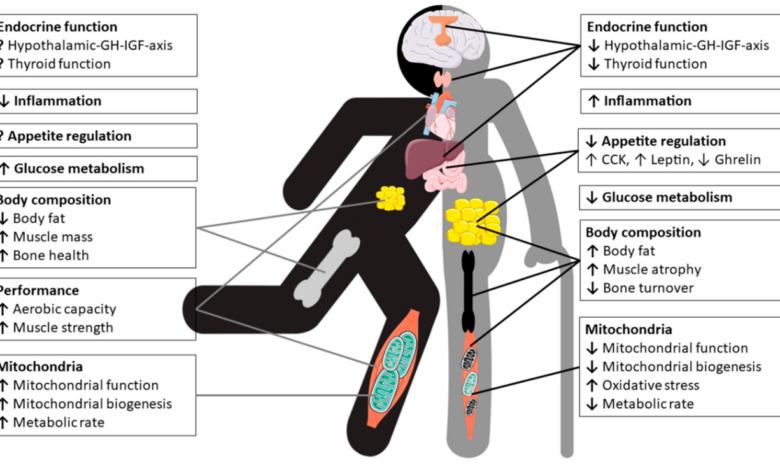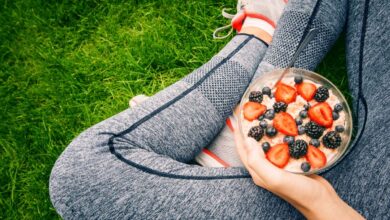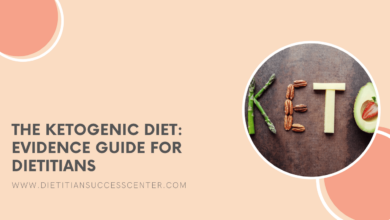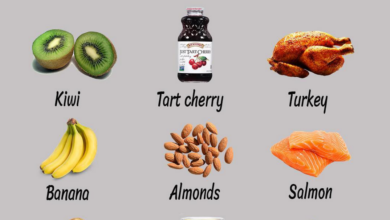
6 Nutrition Obstacles Senior Athletes Need to Overcome
6 Nutrition Obstacles Senior Athletes Need to Overcome: The aging process brings unique challenges to athletes, demanding adjustments in their nutritional strategies to optimize performance and well-being. While maintaining a healthy lifestyle is crucial for everyone, senior athletes face specific hurdles that can hinder their athletic endeavors.
Understanding these obstacles and implementing tailored solutions can make a significant difference in their training, competition, and overall health.
From calorie needs and protein intake to hydration and nutrient timing, navigating these six nutrition obstacles is key to unlocking the full potential of senior athletes. This blog post explores these challenges in detail, offering practical advice and strategies to help athletes overcome them and achieve their athletic goals.
Nutrient Timing and Meal Frequency

Nutrient timing refers to the strategic consumption of food and beverages at specific times to optimize performance and recovery. It is particularly important for senior athletes who may have a slower metabolism and require more support for muscle growth and repair.
Meal frequency, on the other hand, is about how often you eat throughout the day. Both aspects play a crucial role in managing energy levels, maintaining satiety, and ensuring overall health.
Senior athletes face unique nutritional challenges, from maintaining muscle mass to fueling intense workouts. One key aspect is finding healthy and delicious meal options that support their needs. A great recipe to consider is this simple spaghetti squash lasagna , packed with protein and fiber.
This dish can help senior athletes stay energized and recover effectively, tackling those 6 nutrition obstacles head-on.
The Impact of Nutrient Timing on Performance and Recovery
Proper nutrient timing can significantly enhance performance and recovery in senior athletes. Consuming the right nutrients at the right time can help fuel workouts, minimize muscle breakdown, and promote muscle growth and repair.
Pre-Workout Nutrition
A pre-workout meal should provide energy for your workout and support optimal muscle function.
- A combination of carbohydrates and protein is recommended, with a focus on easily digestible carbohydrates like oatmeal, whole-grain toast, or fruit.
- Adding a source of protein like eggs, Greek yogurt, or a protein shake can further support muscle building and repair.
- The meal should be consumed 1-2 hours before your workout to allow for digestion and nutrient absorption.
Post-Workout Nutrition
Post-workout meals are crucial for replenishing energy stores, promoting muscle recovery, and reducing muscle soreness.
- Consume a meal or snack containing carbohydrates and protein within 30-60 minutes after your workout.
- This will help replenish glycogen stores and provide the building blocks for muscle repair.
- Examples of post-workout meals include a smoothie with fruit, protein powder, and yogurt, a chicken breast with sweet potato, or a protein bar with a banana.
Recovery Nutrition
Recovery nutrition is essential for supporting muscle growth and repair, reducing inflammation, and promoting overall health.
- Focus on consuming protein-rich meals and snacks throughout the day, particularly after workouts.
- Include sources of healthy fats like avocados, nuts, and seeds, which help with hormone production and inflammation reduction.
- Hydration is also crucial for recovery, so drink plenty of water throughout the day.
The Impact of Meal Frequency on Energy Levels, Satiety, and Overall Health
Meal frequency can significantly impact energy levels, satiety, and overall health in senior athletes. It can also help regulate blood sugar levels and reduce the risk of chronic diseases.
Energy Levels and Satiety
Eating smaller, more frequent meals throughout the day can help maintain stable blood sugar levels and prevent energy crashes.
- This can be particularly beneficial for senior athletes who may experience fluctuations in energy levels due to age-related changes in metabolism.
- Eating more frequently can also help you feel fuller for longer, reducing the risk of overeating and promoting healthy weight management.
Overall Health
Studies have shown that eating more frequent meals may be associated with a lower risk of chronic diseases like heart disease, type 2 diabetes, and some types of cancer.
From ensuring adequate protein intake to managing hydration levels, senior athletes face unique nutritional challenges. Just like it’s crucial to know which yoga poses to avoid during pregnancy, yoga poses to avoid during pregnancy , understanding these obstacles is essential for optimizing performance and recovery.
For senior athletes, focusing on nutrient-dense foods, staying hydrated, and considering supplements can help overcome these hurdles and maintain peak fitness.
- This is likely due to the benefits of meal frequency in regulating blood sugar levels, promoting satiety, and supporting healthy weight management.
- However, it’s important to note that more research is needed to confirm these findings and to understand the optimal meal frequency for different individuals.
Micronutrient Deficiencies and Supplementation: 6 Nutrition Obstacles Senior Athletes Need To Overcome
Senior athletes, like all individuals, require a balanced intake of essential micronutrients to support optimal health and performance. However, age-related changes in absorption, metabolism, and dietary habits can increase the risk of micronutrient deficiencies in this population.
Common Micronutrient Deficiencies in Senior Athletes
Micronutrient deficiencies can significantly impact athletic performance by impairing energy production, muscle function, immune response, and overall health. Some common micronutrient deficiencies observed in senior athletes include:
- Vitamin D:Vitamin D deficiency is prevalent among older adults, particularly those with limited sun exposure. It plays a crucial role in calcium absorption, bone health, and muscle function, all of which are essential for athletic performance. Deficiency can lead to muscle weakness, fatigue, and increased risk of fractures.
- Iron:Iron deficiency, or anemia, is another common issue in senior athletes, especially women. Iron is essential for oxygen transport and red blood cell production, which are vital for endurance and strength training. Symptoms include fatigue, shortness of breath, and decreased exercise capacity.
- Vitamin B12:Vitamin B12 deficiency can occur due to reduced absorption with age. It plays a role in energy production, nerve function, and red blood cell formation. Deficiency can lead to fatigue, weakness, and cognitive impairment.
- Calcium:Calcium is crucial for bone health and muscle function. Age-related bone loss, combined with inadequate calcium intake, can increase the risk of osteoporosis and fractures. Maintaining adequate calcium levels is vital for senior athletes to prevent injuries.
- Magnesium:Magnesium is involved in over 300 biochemical reactions in the body, including energy production, muscle function, and nerve transmission. Deficiency can lead to muscle cramps, fatigue, and sleep disturbances.
The Role of Supplementation, 6 nutrition obstacles senior athletes need to overcome
Supplementation can be a valuable tool to address micronutrient deficiencies and ensure optimal nutrient intake in senior athletes. However, it’s essential to consult with a healthcare professional or registered dietitian to determine individual needs and appropriate supplementation strategies.
As senior athletes, we face unique nutritional challenges. From ensuring adequate protein intake to maintaining hydration levels, there are many obstacles to overcome. One often overlooked factor is vitamin D, crucial for bone health and muscle function. While sunlight is a great source, we can also get vitamin D besides sun through diet and supplements.
Addressing these nutritional needs helps us stay strong and active, allowing us to continue enjoying our athletic pursuits.
Choosing Appropriate Supplements
When considering supplementation, it’s crucial to choose products from reputable brands and ensure they meet quality standards. Here are some factors to consider:
- Individual needs:Supplementation should be tailored to individual needs based on dietary intake, health conditions, and specific training goals.
- Health conditions:Certain health conditions may necessitate specific supplements or require careful consideration of potential interactions with medications.
- Dosage:It’s important to follow recommended dosages and consult with a healthcare professional to ensure safe and effective use.
- Form and bioavailability:Supplements are available in various forms, such as tablets, capsules, powders, and liquids. Choose forms that offer optimal absorption and bioavailability.
- Potential interactions:Be aware of potential interactions between supplements and medications or other supplements.
Dietary Considerations for Specific Sports
Senior athletes participating in different sports have unique nutritional needs that must be addressed to optimize performance, recovery, and overall health. This section explores dietary strategies tailored to endurance, strength training, and team sports, considering the specific demands of each discipline.
Endurance Sports
Endurance athletes, like marathon runners, cyclists, and triathletes, require a higher intake of carbohydrates to fuel prolonged exercise. The body primarily relies on carbohydrates for energy during endurance activities. Here are some dietary recommendations for senior endurance athletes:* Prioritize carbohydrate intake:Aim for 60-70% of total daily calories from carbohydrates.
Choose complex carbohydrates like whole grains, fruits, vegetables, and legumes over simple sugars.
Optimize protein intake Protein is crucial for muscle repair and recovery. Aim for 15-20% of total daily calories from protein sources like lean meats, fish, poultry, eggs, dairy, beans, and lentils.
Hydration is key Adequate hydration is essential for endurance performance. Drink plenty of water before, during, and after training and competitions. Consider electrolyte-containing beverages, especially during long workouts or in hot weather.
Pay attention to iron and vitamin B12 Endurance athletes are at increased risk of iron and vitamin B12 deficiencies due to increased blood loss and sweat. Include iron-rich foods like red meat, beans, lentils, and fortified cereals in your diet. Consult a healthcare professional to assess vitamin B12 levels and discuss supplementation if necessary.
Strength Training
Strength training involves high-intensity exercises that require significant muscle mass and strength. Senior athletes engaged in strength training need a diet that supports muscle growth and repair.Here are some dietary recommendations for senior strength training athletes:* Protein is paramount:Protein intake is crucial for muscle growth and repair.
Aim for 1.2-1.7 grams of protein per kilogram of body weight daily. Consume protein sources like lean meats, poultry, fish, eggs, dairy, beans, and lentils throughout the day.
Carbohydrates for energy While protein is essential, carbohydrates provide the energy for intense workouts. Include complex carbohydrates like whole grains, fruits, vegetables, and legumes in your diet.
Adequate calorie intake Strength training requires a significant amount of energy. Ensure you consume enough calories to support your training and recovery needs.
Supplement wisely Consider supplementing with creatine monohydrate, a safe and effective supplement that enhances muscle growth and strength. Consult a healthcare professional to discuss the appropriate dosage and potential interactions with existing medications.
Team Sports
Team sports, such as basketball, soccer, and volleyball, involve a combination of endurance, strength, and agility. Senior athletes participating in team sports need a diet that supports all these aspects of physical performance.Here are some dietary recommendations for senior team sports athletes:* Balanced macronutrient intake:Aim for a balanced intake of carbohydrates, protein, and healthy fats to fuel training and competition.
Hydration is crucial Adequate hydration is essential for maintaining performance and preventing dehydration. Drink plenty of water throughout the day, especially during training and competitions.
Consider electrolytes Electrolyte-containing beverages can be beneficial during intense training or competition, especially in hot weather.
Focus on recovery After training or competition, prioritize protein and carbohydrate intake to aid muscle repair and replenish energy stores.
Adjusting Dietary Intake
Senior athletes need to adjust their dietary intake based on training intensity, competition schedule, and travel demands.* Increase calorie intake during periods of high training volume:Increase calorie intake to meet the increased energy demands of heavy training.
Optimize carbohydrate intake during competition Increase carbohydrate intake in the days leading up to and during competitions to ensure adequate energy stores.
Pack nutrient-rich snacks for travel Bring healthy snacks, such as fruits, vegetables, nuts, and protein bars, to avoid relying on unhealthy food options during travel.
End of Discussion

As senior athletes navigate the unique landscape of aging and athleticism, prioritizing nutrition is essential. By addressing the six nutrition obstacles Artikeld above, senior athletes can optimize their performance, enhance recovery, and maintain a healthy lifestyle. Remember, the journey to peak performance requires a comprehensive approach that considers both training and nutrition.
With a strategic and informed approach, senior athletes can continue to excel in their chosen sport and enjoy a fulfilling athletic journey.






